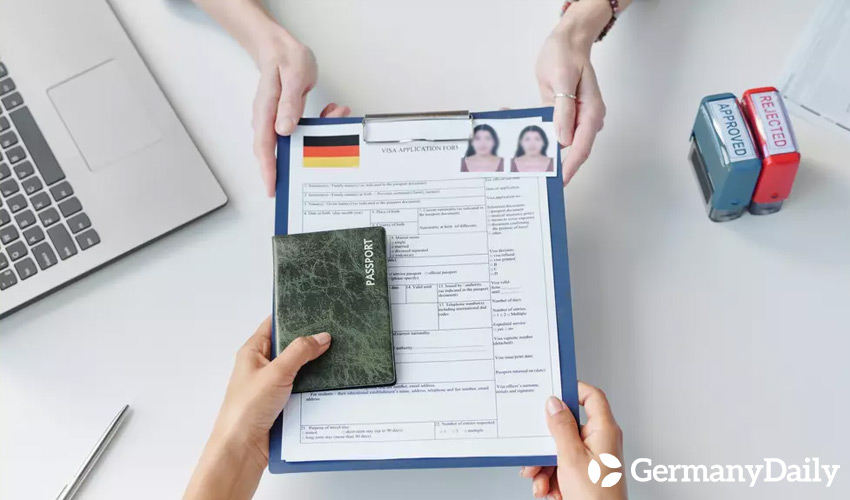All You Need to Know About Post-Study Work Visa in Germany 2024

Germany is a dream destination for settling down for many people around the world. Students who go there don’t plan on coming back most of the time, which leads up to the question – how can you permanently settle down in Germany? One route is getting a post-study work visa in Germany which could lead to permanent residency. Let’s take an in-depth look at what this visa is and how you can get it without facing any troubles.
What is a German Post-Study Work Visa?
Many students plan on settling down in Germany after completing their education. The breathtaking beauty of the country, rich culture, and unlimited job opportunities allure migrants to build their permanent homes in Germany. But what is the best route to do it? The legal and fastest way to obtain a German residency is by opting for a post-study work visa after completing your bachelor’s or master’s.
Every student who completes their studies is eligible for an 18-month Job Seeking Visa, popularly known as the post-study work visa in Germany. This visa enables a graduate to look for a job in their field of education and settle down in the country. They can work freely after obtaining this work permit and support themselves throughout their stay in the country.
Types of Post-Study Work Visas in Germany 2024
Mainly, there are two categories of post-study visas in Germany as of 2024. All international students are eligible for these visas based on their requirements. Let’s take a look at all post-study work visas in Germany to build a better future.
Temporary Residence Permit
Your German study visa will expire as soon as your studies are completed. This is when you apply for an extension to your residence visa to find employment in the country. Since you’re a new graduate from a German university, you have more chances of securing this visa as compared to other candidates. Here’s what you need for this visa:
- Passport and ID
- Degree proof from a German university
- Proof of health insurance
- Proof of finances to support your stay
Job Seeker Visa
This visa is for candidates who have completed their education at a German institute and have returned to their countries. They can apply for this visa from their country; however, this visa is only valid for six months. Here are the requirements for this visa category:
- Proof of academic qualifications from recognized institutes
- Proof of finances in a blocked account
- Certificate of German competency, at least Level B1
- Visa can be applied from the home country only.
Residence Permit of Employment
The Residence Permit of Employment is for international migrants who have completed their studies and wish to continue working in Germany. If you’re looking for long-term employment, then this is the best visa.
However, there is also an EU Blue Card, which enables a non-EU citizen to live and work in 25 other EU countries along with Germany. However, this visa is for highly qualified people, mostly from the STEM (Science, Technology, Engineering, Mathematics) and IT background. Here is everything you need to know about this post-study work visa in Germany.
Eligibility: The eligibility criteria for this visa include successful completion of a degree and vocational training in Germany. You further need to have a work contract or job offer that meets the criteria of this visa category. EU Blue Card holders are to have a minimum gross annual salary of 43,056 EUR to 55,200 EUR.
Duration and Benefits: Based on the employment contract, this visa is generally granted for up to 4 years to let you settle down in the country. During this time, you will have access to several benefits such as public services and social security.
Application Process: To get this visa, you need to apply with the German immigration office (Ausländerbehörde). This requires you to submit all necessary documents, such as proof of financial stability, passport, job offer or work contract, and proof of qualifications.
Temporary Residence Visa for Self-Employment
After graduation from a German university, you can choose to set up your own business or work as a freelancer as well. This permit is available for 3 years, but once your business starts earning enough profit, you can even extend this permit for more time. Here’s what you need to show when applying for this visa:
- Relevant experience in the industry
- Business proposal
- Proof of finances or bank loans for business funding
When to Apply for a Post-Study Work Visa in Germany?
Ideally, the best time to apply for your post-study work visa in Germany is before your study visa expires. Candidates must start looking for work in Germany during their last semester as the 18-month extended visa permit starts right after your final exam results.
Documents Required for Post-Study Work Visa in Germany
Some of the basic documents that you will need handy to apply for a post-study work visa in Germany are:
- German university degree and other educational documents
- Financial proof to support your stay
- Health insurance
- Passport
Apply for Your German Post-Study Work Visa in 2024
Getting a post-study work visa in Germany can be chaotic if you don’t know the process. You should start your research right before graduation to have ample time on your hands. This guide will surely help you understand the different types of residence permits in Germany to settle down and start your family in the country. All you need to do is follow the necessary steps to climb up the ladder and become a German resident in no time!
-
Culture3 years ago
Viking Braids: Styles, Ideas and Method for Men and Women
-
Culture3 years ago
Cultural Integration: Definition, Examples, And Benefits
-
Culture3 years ago
Carmen Winstead: Full Story About the Terrorized 17 Year Old Girl
-
Fitness3 years ago
Best Royal Rumble Matches In WWE History
-
Culture3 years ago
Germany or Sweden: Which is Better For Lifestyle And Why
-
Culture3 years ago
German Mythological Creatures from German Folklore
-
Culture3 years ago
Health Triangle: Everything You Need To Know About it
-
Culture3 years ago
10 Best Examples Of Folk Culture






















